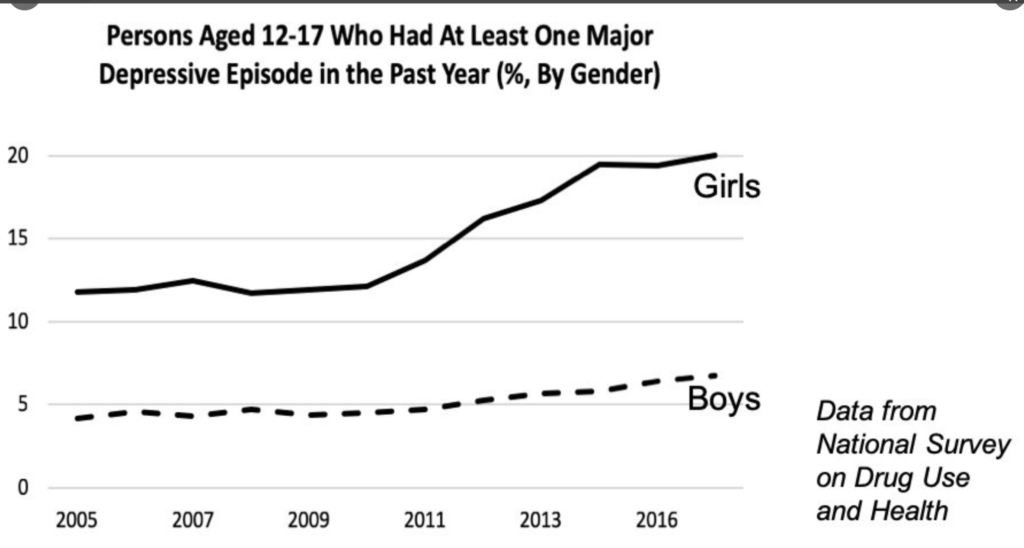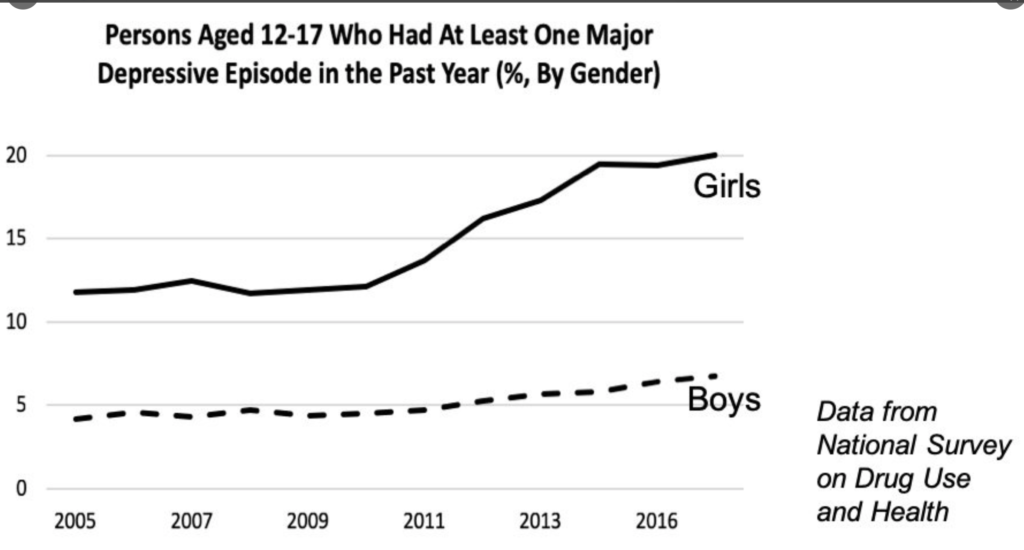Increasingly, when I express my concerns about the sudden dramatic increase in teenaged girls who are declaring themselves to be men trapped in women’s bodies, I receive a rash of ad hominem attacks. For example, I have been accused of being a “conservative,” though I have never affiliated myself with the Republican Party. I have been accused of being anti-trans, which is utterly false. In my view, every adult has the right to do whatever they want to do with their body. I will happily address every adult with whatever pronoun they choose. It is my opinion that all members of the transgender community should all be vigorously protected pursuant to civil rights laws and every other law that applies to every other person.
My concern in writing this article is not about adults. It is about teenagers, especially teenaged girls. Although there appear to be some teenaged girls who are legitimate candidates for transitioning, the recent numbers of girls clamoring for this treatment is extraordinarily and suspiciously high. I also have a personal stake in this controversy. I have friends whose daughters who in various stages of undergoing what might be needless and dangerous medical treatment.
Here are some of the facts that are cause for my concern. These are excerpts from a 2020 article by Abigail Schrier in Quillette titled, “Discovering the Link Between Gender Identity and Peer Contagion”:
In America and across the Western world, adolescents were reporting a sudden spike in gender dysphoria—the medical condition associated with the social designation “transgender.” Between 2016 and 2017, the number of gender surgeries for natal females in the United States quadrupled, with biological women suddenly accounting for—as we have seen—70 percent of all gender surgeries. In 2018, the UK reported a 4,400 percent rise over the previous decade in teenage girls seeking gender treatments. In Canada, Sweden, Finland, and the UK, clinicians and gender therapists began reporting a sudden and dramatic shift in the demographics of those presenting with gender dysphoria—from predominately preschool-aged boys to predominately adolescent girls. . .
In 2016, Lisa Littman, ob-gyn turned public health researcher, and mother of two, was scrolling through social media when she noticed a statistical peculiarity: Several adolescents, most of them girls, from her small town in Rhode Island had come out as transgender—all from within the same friend group. . . . Dr. Littman began preparing a study of her own, gathering data from parents of trans-identifying adolescents who’d had no childhood history of gender dysphoria. . . . She assembled 256 detailed parent reports and analyzed the data. Her results astonished her. Two patterns stood out: First, the clear majority (65 percent) of the adolescent girls who had discovered transgender identity in adolescence—“out of the blue”—had done so after a period of prolonged social-media immersion. Second, the prevalence of transgender identification within some of the girls’ friend groups was, on average, more than 70 times the expected rate.
Many of the adolescent girls suddenly identifying as transgender seemed to be caught in a “craze”—a cultural enthusiasm that spreads like a virus. “Craze” is a technical term in sociology, not a pejorative, and that is how I use it here. (Dr. Littman never does.) It applies to Hula-Hoops and Pokémon and all sorts of cultural fads. If this sudden spike in transgender identification among adolescent girls is a peer contagion, as Dr. Littman hypothesized, then the girls rushing toward “transition” are not getting the treatment they most need. Instead of immediately accommodating every adolescent’s demands for hormones and surgeries, doctors ought to be working to understand what else might be wrong. At best, doctors’ treatments are ineffective; at worst, doctors are administering needless hormonal treatments and irreversible surgeries on patients likely to regret them. Dr. Littman’s theory was more than enough to touch a nerve.
Dr. Littman has been treated unfairly, even grotesquely, by the academic community and by the news media, as reported in this same article. This side issue is well worth considering, as a red flag indicating that many news outlets are being driven by ideology rather than science on this issue.
These same issues are in the process of being discussed in an ongoing series of letters between journalist Abigail Shrier and evolutionary psychologist Heather Heying. [Heying also discussed this issue at the DarkHorse Podcast with Brett Weinstein]. Here is an excerpt from the letters-in-progress:
There are many reasons to believe we are in the midst of a transgender “craze”— a mass enthusiasm that captivates a population so that matters more essential to its welfare fall neglected, to borrow Lionel Penrose’s use of the term. There are the alarming statistics, indicative of an epidemic: For a century, gender dysphoria has been understood to begin in early childhood (ages 2 to 4) and afflict males almost exclusively. In the last decade, apparently out of nowhere, gender dysphoria’s predominant demographic has shifted from young boys to teen girls. (The rise in girls presenting at gender clinics in the UK has been estimated at 4,400%).
All across the West, adolescent girls are suddenly identifying as “trans” with friends, clamoring for hormones and surgeries. Teen girls who are struggling with anxiety and depression but who had no childhood history of gender dysphoria at all. Under the guidance of numberless trans social media influencers, with the encouragement of peers, clusters of girls are transforming themselves from desperately unpopular to the toast of the virtual town.
In my book, I offer several explanations of how this particular social contagion came to befall teen girls. And one of the many flags I plant is this, garnered from academic psychologist Jean Twenge: Teen girls today spend a whole lot less time with each other in person (an hour less per day) than those of prior generations. That’s less time hanging out in each other’s rooms, combing the details of their lives for hidden grandeur; less time savoring gossip and telling secrets; less time caught in the current of breathless laughter, half-shrieking the lyrics of a song.
I wonder whether, as an evolutionary biologist, you agree with the significance of this loss?
[As indicated, the above series of letters is ongoing].
In light of these disturbing statistics, you would think that this topic of gender transitions would be a hot issue that is being vigorously discussed by news media from across the political spectrum. You would be wrong. The Overton Window has shrunk to such a small size that there is no room for frank discussion of these issues at the New York Times or at many other major news outlets. For wide open discussion, you’ll need to look elsewhere. Here are two long interviews by authors of two recent books concerned about the increased incidence of alleged gender dysphoria experienced by teen-aged girls. Both of these interviews occurred on Joe Rogan’s podcast over the past few weeks. Rogan commented on why he is covering this issue during his interview of Dr. Debra Soh:
86:21 [Joe Rogan]: I feel almost pigeonholed by having this conversation with you because I’m having two trans-oriented conversations in the last month or so and I’ve had a couple of them before. I’ve even got messages from people like why do you why are you interested in this? Well, Goddammit, I’m interested in everything! I’m interested in volcanoes, okay? I’m interested in asteroids. I’m interested in a lot of things. This to me . . . I don’t want people to think that the reason why I’m interested is because I’m discouraging it or I’m anti-trans, because I’m absolutely Not. But I am also anti ideologically-based -thinking that’s not logical or fact -based, or that discourages people from asking nuanced questions or observing things for what they really are. Instead of what a certain segment of society wants you to think of them as
[Dr. Soh]: Well, you know, to people who are saying that to you, I honestly believe, give it a couple years and you won’t be asking that question anymore because we will see why these conversations were so critical because we will see the aftermath of not talking about these things.
[Joe Rogan]: I think that’s true and I think there’s a certain amount of cowardice in not discussing these that really really disturbs me disturbs me and makes me very feel Fearful. I know people whose children– very young children–they believe are trans and they’re going to go through this whole thing and give them hormone blockers. I’ve no business to tell them differently. I can’t do anything about it. I just have to. I don’t know I don’t know what’s going on. I just know that it’s a real thing and you have to step back and go what would have happened 20 years ago? What would have happened 30 years ago? Is that better or is this better? Is it better to just let the child become a grown adult and decide for themselves, or is it better to step in and for whatever reason decide that Billy is really Sally? I don’t know and I don’t think anybody knows and I think that’s why this discussion is so Important, because the ramifications of making a wrong choice or of influencing or of deciding for that child it’s so great.
88:32[Dr. Soh]: How can Ii ask you how do you deal with the pushback because it doesn’t seem to affect you at all and I love that and I’m wondering has it always been like that for you or was there a very conscious decision on your part to just not listen to it?
88:44[Rogan]: I know where I’m coming from I know I’m not a hateful person and when I’m when you know there’s a lot of people that have all sorts of crazy opinions about me there’s nothing I can do about that. I just remain true to myself and ask things or discuss things that I’m curious about. That’s it. 89:52 I want people to be happy. I genuinely want as many people in this world to be happy as possible and to be loving to each other and to be kind and open-minded and to allow people to live their life the way they see fit, as long as it’s not doing any harm to other people.
With that context, here are the two recent transgender conversions Joe Rogan has hosted on his podcast. The first is with Abigail Shrier, author of the book, Irreversible Damage: The Transgender Craze Seducing Our Daughters. The second conversation is with Dr. Debra Soh, author of The End of Gender: Debunking the Myths about Sex and Identity in Our Society.
[Added 2020.08.10]
I’m added the following highly relevant charts and (related to these charts) Jonathan Haidt’s interpretation, which includes his strong admonition that teenagers be kept away from social media until they have gone completely through middle school (for that part of the discussion, see beginning at 59:00.




Here’s a new video featuring both Abigail Shrier and Debra Soh discussing transgender issues.